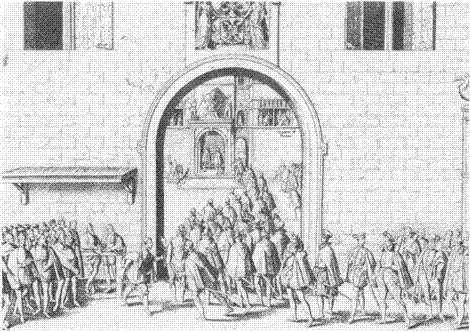
Noblemen presenting their petition to the Duchess of Parma (April 1566). Source: DBNL: digitale bibliotheek voor de Nederlandse letteren
We have all seen movies or read novels where the hero or villain is just one step ahead of the authorities. At barely 20 years old, Junius became a minister to a Reformed conventicle in Antwerp. According to his own journal entries in November and December 1565, after presiding over a clandestine Reformed service among many leading Dutch nobility (Nov. 2), Junius was present for a key conversation involving a conspiracy to take Antwerp by military force by December 3, a plot only dissuaded by Orange himself in favor of more diplomatic means to secure toleration and prevent the arrival of the extraordinary inquisition (ordinary being local by the bishops, extraordinary commissioned by the pope). The confederacy of nobles eventually produced a compromise petition that was presented to the Duchess Margaret of Parma in April 1566.
The petition was signed by approximately 400 noblemen throughout the Netherlands–correction 400 noblemen that could raise, by some estimates, 15,000 heavily armed troops. This brief excerpt from Gerard Brandt’s The History of the Reformation in the Low Countries (1720), details how Junius barely escaped arrest in early 1566 for writing a letter to the King of Spain regarding religious conscience. Once it was discovered that the author was a French Reformed pastor operating clandestinely and illegally in Antwerp, the Marquis of Antwerp enlisted the aid of an artist/spy. The spy would infiltrate Junius’ conventicle, gain his trust, and eventually return a sketch of Junius’ likeness that he might be arrested and his quarters searched. The artist even tailed Junius back to his lodgings. You can read the excerpt to find out how this caper ended.
What a good reminder to historians and theologians how much cloak and dagger surrounded issues of freedom of conscience and toleration in the 16th century, even for a 20 year-old pastor.
